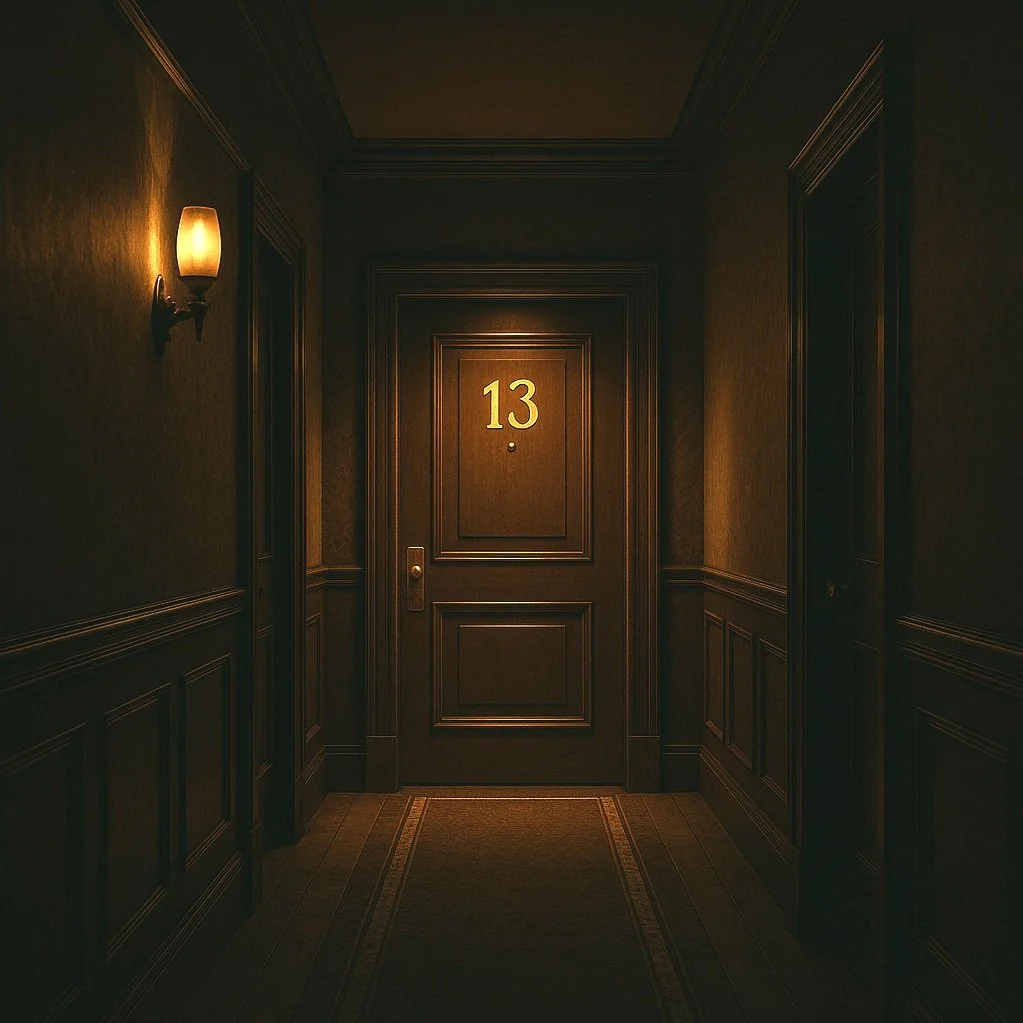Ultra Successful People Who Believe in Superstitions, Especially on Friday the 13th
Explore the origins of Friday the 13th, why the number 13 spooks us, and the weird superstitions of wildly successful people—yes, even Lucille Ball.
June 13, 2025, is the only Friday the 13th this year, and whether you're superstitious or just superstition-curious, it's a perfect moment to dig into one fascinating truth: even the world’s most successful people rely on lucky charms, quirky rituals, and deeply personal beliefs to stay grounded, focused, and yes, lucky.
In this post, we’re exploring the origin of Friday the 13th, why superstitions stick around, and which high-profile names still knock on wood, avoid ladders, and swear by their own private lucky rituals.
Triskaidekaphobia is the fear of the number 13.
🧨 What’s the Deal With Friday the 13th?
The superstition surrounding Friday the 13th is rooted in numerology, religious tradition, and a healthy dose of Hollywood hype. The number 12 is considered a symbol of completeness (think: 12 months in a year, 12 zodiac signs, 12 apostles). Thirteen, on the other hand? It’s seen as off-kilter, unpredictable, and, well - unlucky.
Combine that with Friday, which has historically been viewed as a day of misfortune (Jesus was crucified on a Friday, and some folklore claims that major disasters often fall on Fridays), and you've got a superstition stew that’s been simmering for centuries.
Add the “Friday the 13th” horror franchise to the mix, and the date has become pop culture’s official badge of bad luck.
💀 What Is Triskaidekaphobia?
Triskaidekaphobia (try saying that three times fast) is the fear of the number 13 - and yes, it’s a real psychological condition. The term comes from the Greek words tris (three), kai (and), deka (ten), and phobos (fear). For centuries, 13 has been viewed as unlucky, disorderly, or even cursed. It’s why some hotels skip the 13th floor, airlines avoid row 13, and people hesitate to schedule anything major on the 13th of the month. The fear has even influenced architectural design and urban planning. While not everyone is spooked by 13, triskaidekaphobia continues to shape culture in quiet, and sometimes quirky, ways.
Deep in the Victorian era, The Thirteen Club was formed to counteract the wide-spread superstition of “13 at the table” being unlucky. The notion held that if 13 people are to sit at a dinner table together, one will die within the year. The club’s founding members brazenly flouted this superstition by meeting on the 13th of the month for a dinner served to 13 people. By 1887, the club had at least 400 members, some of whom included William McKinley, Grover Cleveland, and Theodore Roosevelt.
✨ Who Fears 13 and Who Loves It?
Turns out, triskaidekaphobia doesn’t just live in the shadows of superstition: it's got some seriously high-profile believers (and a few rebel fans too).
🙈 Famous People Who Fear the Number 13:
Ariana Huffington - avoids scheduling big events on the 13th.
Stephen King - the master of horror himself has admitted to a fear of the number 13.
Franklin D. Roosevelt - was notably superstitious. He avoided traveling on the 13th day of any month, refrained from lighting three cigarettes with a single match, and never hosted 13 guests at a dinner party. Interestingly, his cousin, Theodore Roosevelt, was a member of the Thirteen Club, which aimed to debunk superstitions surrounding the number 13.
J.K. Rowling - has acknowledged being a bit uneasy around 13, especially on Fridays.
Christopher Nolan - the filmmaker famously structured Inception with 12 dream layers and said 13 “just didn’t feel right.”
Napoléon Bonaparte - despite his prowess in mathematics and leadership, Napoléon harbored a fear of the number 13, showcasing that even great minds aren't immune to superstitions.
🖤 Famous People Who Love or Embrace 13:
Lucille Ball - believed 13 was her lucky number.
Taylor Swift - her favorite number is 13; she writes it on her hand before performances and sees it as a sign of good things.
Dan Marino - NFL Hall of Famer who wore #13 proudly for the Miami Dolphins.
Colgate University - embraces 13 as its official lucky number, with traditions built around it (founded by 13 men with 13 dollars and 13 prayers, naturally).
Alfred Hitchcock - loved to lean into 13’s spooky rep; Psycho was released in 1960… and guess which room the infamous shower scene takes place in?
Woodrow Wilson - considered 13 his lucky number. He even dropped "Thomas" from his name, noting that "Woodrow Wilson" comprises 13 letters. He became president of Princeton in his 13th year there and was elected U.S. President in 1913.
Mary-Kate and Ashley Olsen - were born on a Friday the 13th, (June 13, 1986) and are known to view the number 13 as a positive omen, not a curse.
Many of us hold superstitions around animals such as black cats, birds, and spiders.
🧠 Why We Still Believe in Superstitions (Even With Smartphones in Our Pockets)
Superstitions may sound silly, but our brains actually love them. According to psychologists, rituals and beliefs help reduce anxiety, increase confidence, and create a sense of control during uncertain moments.
They're not just quirks, they’re coping mechanisms.
This is especially true in high-pressure environments like sports, business, or the creative world, where even the most logical people find comfort in things that can’t be fully explained.
💼 Yes, Highly Successful People Are Superstitious Too
Here’s a fun fact: many top performers including CEOs, athletes, artists, and world leaders have deeply held beliefs and ritual behaviors they refuse to skip. It’s not about irrational fear. It’s about focus, familiarity, and faith.
Here are some of the most famous examples:
Serena Williams ties her shoes a specific way, bounces the tennis ball exactly five times before her first serve, and wears the same pair of socks throughout a tournament.
Coco Chanel was said to be deeply superstitious. According to legend she was informed by a fortune-teller that 5 was her lucky number, which is why she named her famed fragrance accordingly. Her apartment also contained a crystal chandelier created with shapes twisted into the number 5, and she liked to present her collections on the fifth day of May (the fifth month of the year) for good luck.
Winston Churchill refused to sit in Room 13 at hotels and believed seating arrangements could shift fate.
Warren Buffet, CEO of Berkshire Hathaway, always carries a lucky coin in his pocket. He’s said to believe that the coin has brought him good luck throughout his life - helping him make some of the best investment decisions of his career.
Diane von Furstenberg has a gold twenty-franc piece her father hid in his shoe during World War II that he gave to her when she was a girl. She tapes the coin in her shoe for good luck before every fashion show. Best known for her iconic wrap dress, von Furstenberg's influential designs are available in more than fifty-five countries worldwide.
Lucille Ball the iconic redhead, television trailblazer, and founder of Desilu Studios was super into astrology and numerology - even delaying contracts or major decisions until the stars aligned. As mentioned above, Lucy believed 13 was her lucky number, proudly going against the grain. But Lucy’s most famous superstition? A lifelong fear of birds. She reportedly refused to have anything with bird imagery in her home. No art, feathers, prints, or décor. It wasn’t just a preference; it was a hard rule. The superstition stemmed from multiple traumatic moments in her life that coincided with the presence of birds. For her, they symbolized bad luck and emotional pain.
Whether rooted in logic or lore, these rituals and rules helped Lucy and others like her feel anchored in industries filled with chaos.
🧪 The Psychology of Superstition in Business
In the entrepreneurial and creative world, superstitions are often rebranded as “rituals” or “mindset prep.” Here’s how founders use them to boost results:
Lighting a specific candle before creating content
Wearing a lucky blazer to pitch investors
Listening to the same playlist before every launch
Carrying a talisman or quote card into meetings
Journaling or meditating on abundance before hitting "send"
Obviously none of these guarantee success, but they build the confidence to go after it.
🪄 How to Create Your Own Lucky Rituals (That Actually Work)
You don’t need to believe in black cats or haunted mirrors to tap into the magic of ritual. Here’s how to use superstition as a power tool:
Choose something meaningful - Whether it’s a lucky pen or a scented oil, it should feel like it holds power.
Make it repeatable - Rituals become powerful through repetition. Use them as mental cues to enter “showtime mode.”
Use intention as the anchor - It’s not about fear, it’s about energy. Use your ritual to set it.
Don’t overthink it - If it works, it works. There’s room for magic and logic in your life.
📆 June 13, 2025: A Lucky Day In Disguise?
This year, Friday the 13th only comes once. So instead of dodging ladders and avoiding mirrors, what if you used the date to reset your mindset?
Launch something new
Make a bold move
Write an intention
Try a new ritual
Remember, luck favors the brave, and the ones who believe in their own weird, wonderful process.
🤳 Friday the 13th Is Peak Social Media Gold! A few fun ideas:
“Superstitions I Swear By (But Won’t Admit Publicly)” poll
“13 Things I Won’t Do Today” carousel
“Is This Ritual Weird or Genius?” founder habits edition
#MakeYourOwnLuck Reels challenge (good tie-in if you’re offering anything manifest-y or product based!)
Bonus Inspo ~ A Little Friday the 13th Lore to Inspire You:
🧛♀️ Dark History + Pop Culture = Friday the 13th’s Bad Rep
Knights Templar Arrested on Friday the 13th (October 13, 1307): This is one of the earliest known associations of bad luck with the date. King Philip IV of France ordered the mass arrest of the Knights Templar, marking the day with betrayal, bloodshed, and infamy. Conspiracy theorists still cite this as the OG cursed 13th.
"Friday the 13th" Film Franchise (1980–present): This slasher series turbocharged the spooky aura around the date. Jason Voorhees and his hockey mask turned an already-suspect day into a cultural monster, literally. The film series has 12 movies so far, and yes, fans are waiting for a 13th.
✨ Cultural Differences: It’s Not Unlucky Everywhere
In Italy, Friday the 17th is the "bad luck" day and 13 is considered lucky!
In Spain and Greece, Tuesday the 13th is their version of the unlucky day.
In China, 13 is neutral and it’s the number 4 (which sounds like “death”) that people avoid.
📉 Real-World Impact of Friday the 13th
Airlines see lower bookings.
Some people genuinely won’t fly on Friday the 13th resulting in slightly cheaper fares and open middle seats (score?).Fewer business deals or surgeries scheduled.
There are documented drops in elective surgeries, major meetings, and even weddings on this date. Some hospitals skip operating rooms labeled 13. Some high-rises don’t have a 13th floor (it jumps from 12 to 14!).The economy takes a tiny hit.
According to a 2004 study by the Stress Management Center and Phobia Institute, an estimated $800–$900 million is lost in business on Friday the 13th due to fear-based cancellations or avoidance.
🎯 Final Thoughts: Superstition Is Strategy Dressed in Sparkle
Whether you’re lighting a candle before a pitch, avoiding Room 13 at your next hotel stay, or just keeping that “lucky” playlist on repeat ~ there’s power in belief. Even science agrees.
And if Lucille Ball, Coco Chanel, and Steve Jobs can lean into a little magic... maybe we all can.
Related:
June Holidays, PR Trends, and Social Media Days.
Why Halfway to Halloween is Something Your Marketing Department Should Make Note Of
📩 Contact Us and Book a Discovery Call








